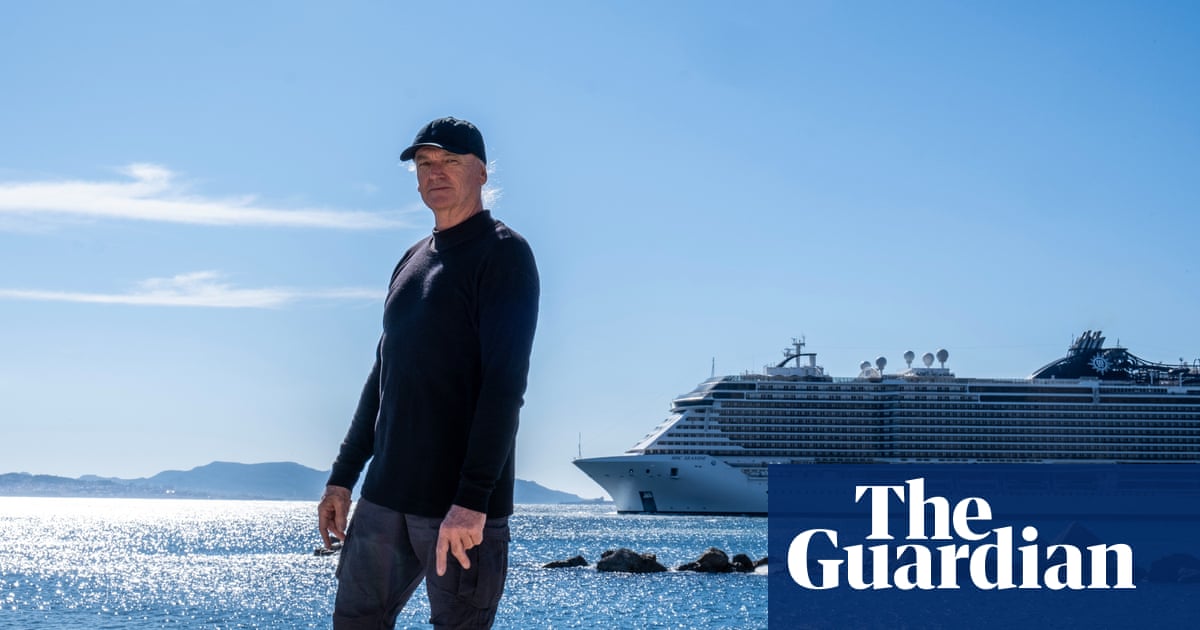Few people know the sea better than Guillaume Picard. He grew up on a boat moored in the port of Hyères in southern France after his parents left 1960s Paris. His first job was on a sailing boat. Then he spent 30 years in the merchant navy before becoming a commercial captain, ferrying tourists and containers across the Mediterranean for more than two decades.
Now aged 65, his grey hair in a ponytail, it is with no small note of sadness that he says, increasingly, it is the land that calls him. âTo be completely honest, I want to go to sea less and less,â he says. âI go hiking a lot in the mountains with my wife, and weâve found an environment that is much more preserved. The mountains are beautiful wherever you go.â
Picardâs beloved sea is being destroyed, he believes, by something uncomfortably close to home: cruise ships. Fifteen years ago they were a rare sight in Marseille. Now, Franceâs second city is one of Europeâs busiest cruise ports. Last year, 2.5 million passengers stopped off, according to the port authority, a million more than the year before.
Faced with this new reality, Picard has decided to become the seaâs protector, swapping his captainâs whites for the all-black of a non-violent protester. His new crew is a growing group of activists known as Stop Croisières, or Stop Cruises. âAt some point we will have to make a choice for our children, for our grandchildren,â he says. âDo we continue to make bigger and more energy-consuming ships with more and more people on board? Are we really going to be able to continue to live on this Earth like this?â
The group is part of a growing protest movement against the cruise ship industry and overtourism across Europeâs cities more broadly. Throughout August, Extinction Rebellion stopped cruise ships entering ports in the Netherlands, and earlier in the year tourists were targeted with water pistols in Barcelona by campaigners demanding, among other things, the closure of cruise ship terminals.
Some cities are implementing measures to limit the cruise industryâs activity, such as banning the ships from city centres, reducing the number that can visit and introducing a tax on passengers. But in Marseille the situation seems harder to change.
Two years ago, the cityâs mayor, socialist Benoît Payan, launched a petition calling for limits on the number of cruise ships allowed to arrive during times of peak pollution, declaring: âMarseille is suffocating.â It attracted more than 50,000 signatures, but little further action. Instead, plans are going ahead for a new cruise terminal to open in 2026 in the Port of Marseille, which is controlled by President Macronâs government in Paris.
âWe are not at all decision makers in Marseille, unlike other ports where there are more restrictions for local communities,â says Sébastien Barles, deputy mayor for the environment. âI think no one in Marseille, except for some merchants, can say cruises bring them a lot of money.â
Stop Croisières first attracted attention in 2020 when its members â the core of whom now number between 50 and 100, says Picard, including paramedics, lawyers and ecologists â unfurled a banner over a bridge in the northern neighbourhood of LâEstaque, saying: âIn Marseille, breathing kills.â The group made the news again in 2022 when it carried out its first kayak stunt, holding up the Wonder of the Seas, then the worldâs largest cruise liner. Then last month the group kayaked out into the mouth of the port of Marseille and delayed three cruise liners for several hours before being arrested. After both the groupâs kayak stunts, its activists were arrested and then released.
Picard, who has two daughters and grandchildren, has become a kind of father figure to the group. âIâm extremely touched by the commitment of all these young people I see at Stop Croisières,â he says. âThey could all be my children, almost. And I find them extremely motivated, well organised, and aware of the world in which we live.â
For Picard, the switch from boat captain to protester has been a long journey of self-education. When he started working on ships he knew they were âmachines that pollute a lotâ, but little more than that, he says. He became increasingly aware of the impact of parking such âbig monstersâ in the middle of a city, and when his first grandchild was born he decided he needed to act. He says some former colleagues now resent him, while others sympathise without daring to speak out. The captain of one of the liners the activists stopped last month was an old colleague who left him a voice message during the protest. âI havenât listened to it,â he says.
He has regrets about his former career as a commercial sailor, but is trying to share his knowledge of the maritime world with as many people as possible in the hope that it can be useful. âI certainly feel guilty,â he says. âItâs guilt for having participated in the destruction of life. But maybe that is the engine that makes me an activist now.â There is also something stronger than guilt driving his actions. âI also have a huge feeling of anger against the shipping companies.â
Despite his disillusionment with the current state of play, he has not lost hope of rediscovering his love of the sea. âFor the moment itâs a bit like itâs on standby, the sea. With Stop Croisières I interact with it in a different way.â



